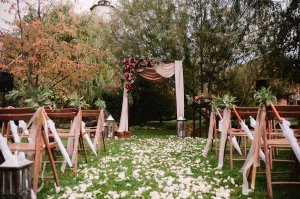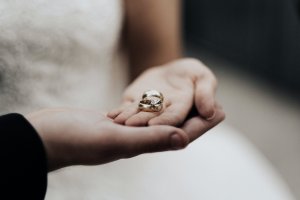Wedding law in England and Wales is badly out of date.
We campaign for marriage to be equally open to all, regardless of religion or belief.
Time for one wedding law for all.
In England and Wales, different laws apply depending on whether a wedding is Anglican, Jewish, Quaker, another religion or not religious at all (a civil wedding or partnership).
This is unfair, confusing and absurd.
Most religious weddings must be held in a registered place of worship, while civil weddings and partnerships must take place in approved premises. Jewish and Quaker weddings can take place anywhere.
This system leads to inequality. Members of religions which don't have fixed places of worship, or don't use their places of worship for weddings, are disadvantaged. And members of nonreligious communities such as Humanism have no way of getting legally married according to their philosophical beliefs.
The process for a place of worship to register itself for marriage is much cheaper than for approved premises for civil ceremonies. This in turn contributes to the cost of civil marriages and partnerships.
Over 80% of opposite-sex marriages in England and Wales in 2019 were civil marriages. But only 16% of recognised wedding venues in England and Wales can hold civil marriages. The remaining 84% are religious venues.
While approved premises for civil weddings and partnerships must by law hold ceremonies for same-sex couples, this is not the case for places of worship. In 2022, only 2% of places of worship were registered for same-sex weddings. This considerably reduces the options for same-sex couples. Whereas opposite-sex weddings are in slow decline, same-sex weddings are increasing.
UPDATE: The Law Commission has now made its final recommendations on reforming wedding law on England and Wales. Please write to your MP in support of the recommendations...
Unregistered religion-only 'marriages'
The complexity of marriage law may contribute to the rise in couples who have religious 'wedding' ceremonies that are not legally-binding.
A signification proportion of Muslim couples are in an Islamic 'nikah' union lacking the full legal rights and protections of a recognised marriage.
Unregistered marriages can undermine women's rights in particular. If a woman in a nikah is 'divorced' suddenly, or against her wishes, she can be left homeless and without any money or assets.
The situation is made worse by sharia councils or 'courts' which dispense religious rulings on Islamic marriage, child custody and divorce. These are not courts of law but there are concerns some Muslim women, especially those not born in the UK or unable to speak English, perceive them as having real legal authority.
Sharia councils leave children vulnerable and discriminate openly against women. To seek a religious divorce a woman must gain permission from these almost entirely male councils, and there are reports of women being denied this request even in cases where they have faced abuse.
Reforming wedding laws will not solve these problems completely. But making wedding laws simpler and fairer can encourage couples to gain the legal protections of a registered marriage.
Take action!
1. Write to your MP
Tell your MP to support the Law Commission's recommendations for wedding reform.
2. Share your story
Tell us why you support this campaign, and how you are personally affected by the issue. You can also let us know if you would like assistance with a particular issue.
3. Join the National Secular Society
Become a member of the National Secular Society today! Together, we can separate religion and state for greater freedom and fairness.
Latest updates
NSS welcomes plan to give couples more freedom over where they marry
Posted: Thu, 3 Sep 2020 11:58
The National Secular Society has welcomed proposals to grant couples more freedom over where they choose to marry as part of a comprehensive reform of England and Wales's wedding laws.
The Law Commission has proposed introducing an officiant-based system for the legal recognition of marriage, to replace the current restrictive building-based system, in line with NSS recommendations.
This would mean all weddings were legally permitted to take place in a location chosen by the couple. Couples will be able to marry outdoors or in their own homes.
The proposals would enact several measures which the NSS has lobbied for:
- Universal legal rules would be introduced for all weddings, with very few exceptions. Different rules currently apply to Anglican weddings, Jewish and Quaker weddings, other religious weddings, and civil weddings.
- A requirement that some ceremonies include "prescribed words" would be abolished. Couples will now be able to have religious songs, readings and hymns as part of their civil weddings, provided the ceremony is still identifiable as a civil ceremony.
- Universal civil preliminaries – the steps that must be taken before a couple is authorised to have a legally binding wedding – would be introduced.
They would also allow weddings conducted by non-religious belief organisations, such as Humanists, or independent celebrants to be recognised, if the government decided to permit them.
The Law Commission will now consult on its proposals before making recommendations to the government.
Commission's justification
The commission says the current law is a "complex maze of different rules for different types of ceremonies, based around the use of particular types of building".
"But in the past two centuries, England and Wales have experienced profound social changes. As a society, we are far more culturally and religiously diverse, we are far more secular and people want to celebrate their weddings in varied and unique ways."
It adds that the "essential" requirement to protect the state's interests and "ensure legal certainty" is that "each party to the marriage expresses their consent to marry the other".
NSS comment
NSS head of policy and research Megan Manson said the proposals would represent "a welcome and significant overhaul of the law governing weddings".
"If enacted these reforms would create a more secular and less restrictive system of marriage, giving couples the flexibility and freedom to marry in a way that is meaningful to them.
"There are also welcome signs that they would help to protect the individual rights of those marrying in a variety of religion and belief traditions.
"We look forward to responding to the consultation."
Notes
- The NSS has argued for comprehensive reform of marriage law to ensure greater clarity and fairness for all couples in recent years, and has lobbied the Law Commission as part of this process.
- The Law Commission is a statutory independent body which keeps the law in England and Wales under review and recommends reforms where it considers them necessary.
- The commission's consultation paper is available here. A shorter summary document is also available, along with an at-a-glance overview.
Marriage law in England & Wales is discriminatory, High Court rules
Posted: Fri, 31 Jul 2020 15:55
The High Court has ruled that marriage law in England and Wales gives rise to discrimination on religion and belief grounds, in a judgment which could prompt wide-ranging reform.
The court found six Humanist couples suffered "real" discrimination because Humanist marriages are not recognised in law.
But their attempt to secure legal recognition for Humanist marriage was dismissed because the government is "considering the appropriate remedy" as part of a "wholesale reform" of marriage law.
The couples desired to be legally married "according to the usages of" Humanists UK, which supported their claim, and without the attendance of state officials at their weddings.
They said they were being treated differently because religious groups can have legally-recognised marriages. They claimed a breach of the right to freedom of religion or belief, which is protected by human rights law.
Mrs Justice Eady accepted the government's defence that reform of marriage law cannot be undertaken in a "piecemeal" fashion.
She added that if Humanist marriages were given legal recognition "that may well give rise to questions as to whether wider reforms are necessary".
The court noted that the Law Commission concurred with the government's view and is set to hold a consultation on marriage law later this year.
NSS position on relevant marriage law
Currently Anglican, Jewish and Quaker marriages are automatically recognised in law. Marriages of other religious groups are legally recognised if they take place in a registered place of worship.
Civil marriages must take place in 'approved premises' and no religious content is permitted in the ceremony.
The National Secular Society is campaigning for wide-ranging reforms to the marriage laws to ensure greater simplicity, equality and freedom for all.
NSS comment
NSS head of policy and research Megan Manson welcomed the ruling.
"We welcome the clear recognition from the court that England and Wales's current marriage laws are discriminatory and not fit for purpose.
"It is also encouraging that the court recognises the wisdom in wider reforms to marriage law to ensure equality for all. Marriage legislation has been made on a piecemeal basis for too long, resulting in an over-complex system that privileges some groups and discriminates against others.
"Our proposals for one marriage law for all, suitable for all couples whatever their religion or belief, would give much-needed simplicity, clarity and equity to the institution of marriage. We look forward to discussing these further with the Law Commission."
Photo by Doğukan Benli from Pexels.




